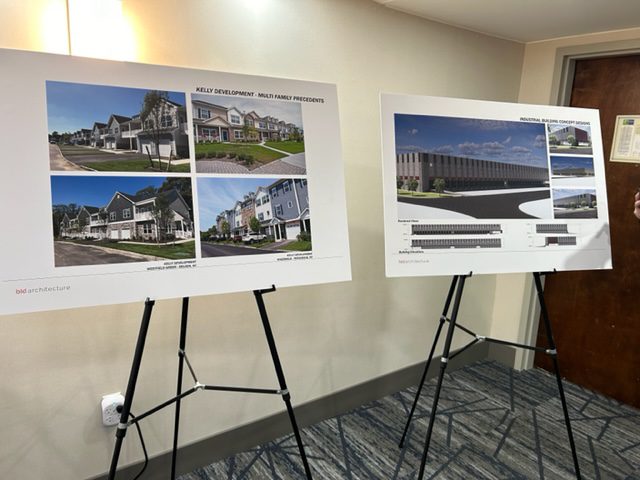Warehouses or rental units? Northville wants to know

Elected officials stayed to discuss concerns after residents meeting canceled due to overcapacity
By Mallie Jane Kim
Setauket residents showed up in force to a March 25 meeting about the proposed development of a Northville Industries property bordered by Belle Mead and Upper Sheep Pasture roads in East Setauket. In fact, so many showed up to the Holiday Inn Express in Centereach that the meeting had to be canceled and rescheduled due to fire hazard.
But that didn’t stop meaningful discussion about the issue, as Northville representatives and local elected officials stayed behind to dig into concerns and contentions.
At issue is a site plan Northville sent to neighbors proposing the addition of three giant warehouses to its property, which also houses a collection of gas storage tanks. The idea has already proved unpopular with residents, and though Northville has submitted the plan to the Town of Brookhaven, it has not been reviewed or approved. The Monday meeting was arranged by Northville, without town involvement.
Also on the table was a secondary plan Northville representatives touted: multifamily rental homes. Posters displayed in the meeting room depicted the two options, namely one concept-design poster of grey monolithic warehouses next to another filled with bright, landscaped townhome photos from Westfield Green in Selden. There were also two site plan maps indicating where the proposed warehouses would go, and where a potential 140 rental units could sit.
“No new multifamily residential units have been built in this particular zip code in 25 years,” said Northville CEO Steve Ripp after residents had left the hotel. “I think there is a benefit for folks who would like to remain within the community but no longer want to have their single family home for whatever reason.”
Northville representatives suggested such rentals could serve older residents who want more flexibility than maintaining a freestanding house allows, as well as university students or young adults who want to stay in the area but can’t afford a single family home.
Suffolk County Legislator Steve Englebright (D-Setauket) pushed back against the idea that the housing plan was a better option.
“If they have an as of right [to build within their industrial zoning], they should do it and do it right,” he said. “But to do a swap for high-density residential, such as you would find in central Queens or Brooklyn, is unacceptable.”
Englebright added that neither Northville proposal was “ready for prime time,” as the town has not come back with suggestions, and there hasn’t been an environmental review.
Allowing Northville to change zones to add multifamily homes, according to Englebright, could open the floodgates for other light industrial property owners around Brookhaven to do the same, leading to overdevelopment.
Englebright emphasized that Northville is important to the area’s infrastructure as a provider of fuel for automobiles and homes, though he said the number of people who showed up to the meeting reflects how controversial any development will be.
“The community is a suburban community,” Englebright said. “Proposing urban density here is the beginning of the end of our way of life. And that’s unacceptable.”
Ripp pushed back against the suggestion that multifamily rentals would change the character of the community, and said concerns over traffic were “alarmist” since warehouse trucks would travel at off-peak hours.
“We’re building something,” said Ripp, adding that the company hasn’t developed its property in over 25 years. He said the meeting presentation was intended to see what the community preferred.
Town Councilmember Jonathan Kornreich (D-Stony Brook), who also stayed after the meeting, said Long Island infrastructure is already at carrying capacity, and the company was not presenting a real choice.
“Not that I would equate this in a moral sense,” he said, “but if someone comes up to you on the street with a gun and says, ‘Your money or your life,’ you are being offered a choice, right?”
But Ripp said it was unreasonable to expect Northville to stick with the status quo.
“If [people] don’t want it developed, they should talk to the Town of Brookhaven to say, ‘Buy the land from Northville,’” Ripp said. “You can do what you’re permitted to do with your land.”
Meeting rescheduled, community reacts
Earlier in the evening, the meeting room, which hotel staff said had a capacity of 100 people, quickly filled beyond capacity, with residents crowding into standing room. More were waiting to ride up the elevators to the sixth floor, and more still were unsuccessfully circling the parking lot to find spots, with some reportedly attempting to park along Route 347.
“We got a great community turnout, more than we possibly could have anticipated,” said Northville lawyer Timothy Shea, who indicated they would find a larger place to host the meeting next time. “We want to hear what everybody has to say.”
Residents filing out of the room when the meeting was canceled primarily expressed frustration and suspicion.
“It’s a disaster,” said Kerry Menendez, who lives on Storyland Lane, close to the Northville site. Menendez suggested the company’s lack of preparation for a big turnout was indicative of how she thought they’d handle any development in the future. “And with their track record — how they’re showing their face in this community right now, I don’t even know.”
That track record includes a 1.2 million gallon gas leak, revealed in 1988, which some meeting attendees remembered first hand. Like Corinne Keane, who grew up on Robin Hood Lane and lives in the same neighborhood now. Her home was in the area affected by the spill, and she said she remembers a testing well dug at her family’s front curb, and men in gear frequently testing the level of contamination there. Her family was part of the settlement Northville paid out to homeowners.
“They paid our families, which didn’t change anything because the home values were significantly affected by it,” she said.
Keane is not a fan of any development on the Northville site, and not only because of the history. “It’s going to bring traffic,” she said, especially if the company is successful at getting a driveway put in on Upper Sheep Pasture Road, something the town has said is not allowed. “It’s a blind curve. It’s going to create a lot of accidents, and the traffic is going to be backed up,” Keane said.
According to Ripp, the plans are still in the early stages, and he said Northville didn’t rule out structural improvements like widening Belle Mead Road, for example.
He also addressed the company’s environmental background. “People are traumatized by what happened to them, and for good reason,” he said, pointing out how terrible it was that a plume penetrated the ground under homes — but also that it was an accident that happened due to a tiny hole in a pipe, and despite Northville following industry regulations.
“It was a terrible thing for Northville also,” he said, indicating loss of inventory as well as the money paid out in cleanup efforts, damages and settlements. In all of it, Ripp said, Northville stuck it out and didn’t declare bankruptcy to absolve themselves of making things right — and that the environmental fines went on to provide the seed money to preserve the Pine Barrens area of Brookhaven. “That turned a really horrible situation into something with long-lasting benefits,” he said.
Ripp also pointed out that cleanup was completed 20 years ago, and the company has faithfully provided fuel for the community in all that time. “I think we have been a good neighbor. We have supplied [gas] safely and consistently. Through all weather events and what have you, Northville has always been there,” he said. “It’s disappointing that we never get absolved of that [spill].”
Kornreich asked if Northville would apply that idea of being a good neighbor if the town continued to reject rezoning for multifamily residences and the community protested the idea of a major industrial build.
“Would you listen to the community and say, ‘OK, we’ll look for something that’s a little bit lower intensity?’” he asked.
Ripp said no. “That simply doesn’t have anything to do with integrity — we have land rights, we have property rights,” he said. “We are a business, you know, we’re trying to make money from this. We have rights, too.”






